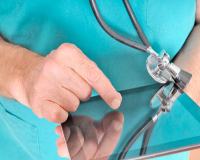
The issue of HIPAA (the Health Insurance Portability and Accountability Act) compliance is one that any user of any portable device for accessing patients’ PHI (Protected Health Information) needs to take very seriously. A recent $1.5 million settlement between Blue Cross Blue Shield of Tennessee and the Department of Health and Human Services for a HIPAA violation, while not involving mobile devices, underscores the potentially steep costs of non-compliance. Business Associates (entities that provide patient information-related services to healthcare providers) can be held liable as well as the “covered entities” stipulated by HIPAA, and the mandated audits are essential for preventing any data breaches.
iPads and other portable devices are safest when PHI is not stored locally, but accessed via a virtual desktop infrastructure (VDI) solution. Citrix and 2X are two excellent solutions that work with the iPad and iPhone as well as other devices. Microwize Technology can facilitate implementing VDI and remote networking solutions for medical practices looking to take advantage of the latest technology to access EHRs and medical billing software such as Medisoft and Lytec.

